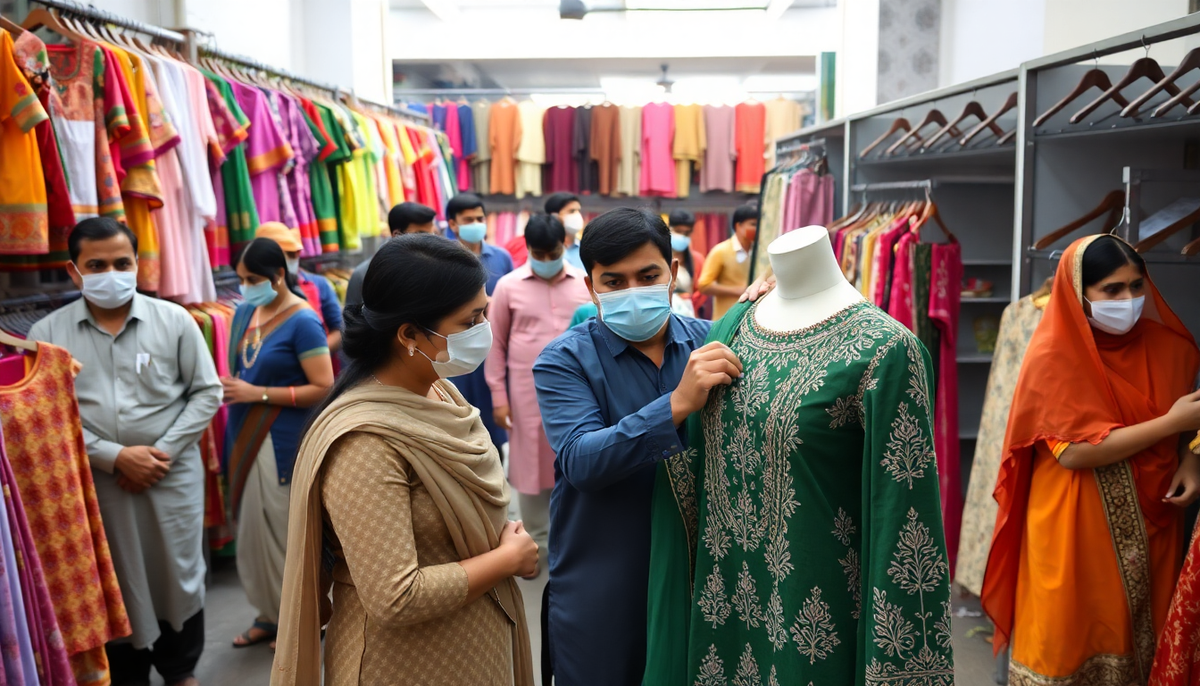- Regular Price
- £19.99
- Sale Price
- £19.99
- Regular Price
- £19.99
- Unit Price
- per

The fashion industry has been one of the hardest-hit sectors during the Covid-19 pandemic. From global supply chain disruptions to changing consumer behavior, the industry has had to adapt and evolve rapidly. In Pakistan, the fashion landscape has also undergone significant changes, with the pandemic leaving an indelible mark on the industry.
One of the most notable impacts of Covid-19 on Pakistani fashion has been the shift towards more comfortable and practical clothing. As people spent more time at home, the demand for formal wear and occasion-based outfits declined, while the need for loungewear, athleisure, and casual clothing soared. Designers in Pakistan quickly pivoted their collections to cater to this new reality, offering a wider range of relaxed and versatile pieces that could be worn both at home and for occasional outings.
Another key change has been the accelerated adoption of e-commerce. With physical stores forced to close during lockdowns, many Pakistani fashion brands and retailers had to rapidly develop their online presence to reach customers. This has led to a surge in online shopping, with consumers becoming more comfortable with the idea of purchasing clothing and accessories without physically seeing or trying them on. Brands like Queen Libas, a leading Pakistani designer label, have seen a significant increase in their online sales, as they offer a vast collection of designer suits for women that can be easily browsed and purchased from the comfort of one's home.
The pandemic has also had a significant impact on the production and supply chain of the Pakistani fashion industry. Lockdowns and travel restrictions disrupted the flow of raw materials, leading to delays and increased costs. Manufacturers had to adapt their processes to comply with new health and safety protocols, further adding to the challenges. This has resulted in a greater emphasis on local sourcing and production, as brands seek to minimize their reliance on global supply chains.
Despite these challenges, the Pakistani fashion industry has shown remarkable resilience. Designers have embraced digital platforms to showcase their collections, engage with customers, and even host virtual fashion shows. This has allowed them to maintain their visibility and continue to inspire and captivate their audience, even in the midst of the pandemic.
Moreover, the crisis has also presented new opportunities for the industry. With a growing focus on sustainability and ethical fashion, Pakistani designers have been exploring more eco-friendly materials and production methods, catering to the evolving preferences of conscious consumers. This shift towards a more sustainable future for the industry is a positive outcome that may outlast the pandemic.
In conclusion, the Covid-19 pandemic has undoubtedly transformed the Pakistani fashion landscape, but the industry has demonstrated its ability to adapt and innovate. As we move forward, it will be interesting to see how the industry continues to evolve and what new trends and innovations emerge, shaping the future of fashion in Pakistan.
The pandemic has led to a significant shift in consumer preferences, with a greater emphasis on comfortable and practical clothing. As people spend more time at home, the demand for formal wear and occasion-based outfits has declined, while the need for loungewear, athleisure, and casual clothing has soared. Designers in Pakistan have quickly adapted to this new reality, offering a wider range of relaxed and versatile pieces that can be worn both at home and for occasional outings.
The pandemic has accelerated the adoption of e-commerce in the Pakistani fashion industry. With physical stores forced to close during lockdowns, many brands and retailers had to rapidly develop their online presence to reach customers. This has led to a surge in online shopping, with consumers becoming more comfortable with the idea of purchasing clothing and accessories without physically seeing or trying them on. Brands like Queen Libas, a leading Pakistani designer label, have seen a significant increase in their online sales, as they offer a vast collection of designer suits for women that can be easily browsed and purchased from the comfort of one's home.
The pandemic has also had a significant impact on the production and supply chain of the Pakistani fashion industry. Lockdowns and travel restrictions have disrupted the flow of raw materials, leading to delays and increased costs. Manufacturers have had to adapt their processes to comply with new health and safety protocols, further adding to the challenges. This has resulted in a greater emphasis on local sourcing and production, as brands seek to minimize their reliance on global supply chains.
Despite the challenges, the Pakistani fashion industry has shown remarkable resilience. Designers have embraced digital platforms to showcase their collections, engage with customers, and even host virtual fashion shows. This has allowed them to maintain their visibility and continue to inspire and captivate their audience, even in the midst of the pandemic.
Moreover, the crisis has also presented new opportunities for the industry. With a growing focus on sustainability and ethical fashion, Pakistani designers have been exploring more eco-friendly materials and production methods, catering to the evolving preferences of conscious consumers. This shift towards a more sustainable future for the industry is a positive outcome that may outlast the pandemic.
0 comments